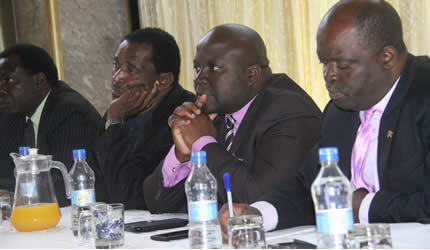Harare relaxes building by-laws
to use farm bricks to partition their rooms but would still be required to use the Standard Association of Zimbabwe approved bricks for outer walls that carry the roof.
Deputy housing director Mr James Chiyangwa confirmed the development during a recent learning tour of the City’s US$5 million housing project in Dzivarasekwa by Masvingo City and Masvingo Rural District councils. The two councils were in Harare last week to acquaint themselves with new housing technologies such as the ecological sanitation toilet, that could be used in areas that are not connected to sewer lines.
This is a waterless toilet system for home or outdoor dry requirements. It is entirely isolated from the surrounding environment and does not contaminate underground water sources. The human waste could be harvested as manure for gardens and fields.
They also wanted to learn about parallel development where construction of houses takes place while services like tarred roads, water, electricity and sewer are being put in place.
Mr Chiyangwa said the city now allowed the temporary construction of ecosan toilets while residents waited to be connected to sewer lines.
For as long as there is proper sanitation, people would be allowed to occupy their stands, he said.
In the past residents were not allowed to occupy their houses if their roads were not tarred.
For internal partitions, people can use any type of brick. It makes the project cheaper, he said.
The city has also relaxed the minimum stand size. Traditionally the minimum stand size has been 300 square metres in the high-density suburbs.
“Minimum stand sizes are now 150 square metres. We have also agreed on gravel roads,” he said.
Mr Chiyangwa said the city was also looking at alternative sources of power for new suburbs. He said Dzivarasekwa Extension might be the first suburb to be fully connected to solar energy.
Masvingo chief environmental officer Mr Zvapano Munganasa said his city wanted to replicate what it saw in Dzivarasekwa Extension on Victoria Ranch, which has 3 000 residential stands.
The city does not have funds to put sewer infrastructure and would therefore proceed with the temporary ecosan toilets while it mobilised funds for sewer reticulation.
He said the city was working with Masvingo Rural, which is the present administrator of the area that would soon be incorporated into Masvingo urban.
“We came here to learn. Our people have already moved in to occupy their stands and have started construction. We therefore want to put in place sanitary facilities,” he said.
The tour was organised by the Homeless People’s Federation — the champions of the ecosan toilets.
Homeless People’s Federation board member Mr Devias Muvindi said 480 families had been accommodated in Dzivarasekwa Extension. The families are part of the group of people that were affected by Operation Murambatsvina.
The US$5 million from the Bill and Melinda Gates Foundation was initially meant to develop town houses at Tsiga in Mbare and for the upgrading of the 58 Mbare hostels.
The project was resisted in Mbare and moved to Dzivarasekwa.










Comments